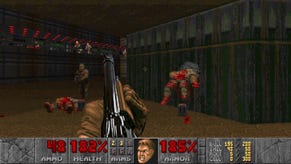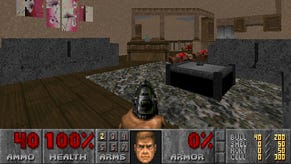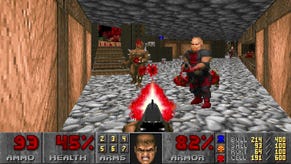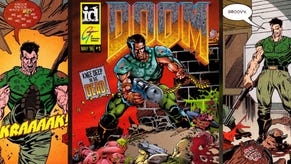Video(game) Nasties Saved My Life
Doom was our safe place
Being a teenager is difficult. Games were very important to me during the most difficult parts of those difficult times and when the going got tough, they helped me to survive.
This is an occasionally grim story, told with the consent of those involved. It involves self-harm, suicide and mental illness.
I saw too much blood in my teenage years. Most of the blood belonged – or had once belonged to – my sister. She lives with and currently kicks the backside of a dissociative disorder, but for almost a decade the illness seemed to be winning and every week there was enough evidence of its strength to decorate a particularly grisly crime scene.
Music was, if not the trigger, the release. Certain songs, certain bands, certain lyrics. There must have been a hundred or more tracks that I could recognise instantly as a sort of defense mechanism. Opening chords would make me switch off the television or remove my sister from the scene, knowing the reaction would be almost instantaneous. Sometimes the release was necessary, and conducted privately, but it would happen no matter what. I'd sit by her side in shops and on busy streets, holding bandages to fresh cuts. Responses from strangers ran the spectrum from overbearing concern to confused aggression.
A woman with two young kids who were excitedly trying to get a glimpse of the blood pooling on the floor offered to call an ambulance or the police outside a health food shop in the centre of Manchester.
“Has there been an accident?” She asked. If there hadn't been an accident, her tone suggested, then violence had been done intentionally. Well, yes.
I explained as best I could. She does this to herself. She'll be OK. She'll be OK. I'm looking after her. She's my sister.
No doubt my apologetic defensiveness was easily mistaken for guilt. The violence was so familiar to me that I no longer saw it as danger. The embarrassment was stronger than the fear. Extreme self-harm and frequent suicide attempts had become part of life's fabric. We'd assimilated them into our daily routine as ridiculous as that sounds – when people threatened to pull back the curtain, I realised how it would look to them.
Every home has its peculiarities, which is one of the reasons social gatherings at Christmas and other scheduled times often require an elaborate performance. Avoid the odd practices, the rough edges. Some secret habits are pleasant and comforting – the pet names and silly mannerisms that even the most composed couples undoubtedly use in private – but others are mechanisms to cope with (and sometimes enable) distress. Living with illness can seem extraordinary, even though it's more common than people sometimes assume, and as an already fractured family we sometimes nurtured the pain in the hope that it wouldn't lash out if treated with kid gloves.
Anyone peeking through the window might have thought we'd invited a dangerous creature into our home, and that we sat back and did nothing as it tore through my sister.
No Smith family outing was complete without a scalpel (cleaner, easier cuts, less risk of infection) and a set of bandages in those days. Now, I'm more likely to pack a picnic blanket and a thermos flask.
Music may have been the conduit for self-harm but it wasn't the cause. If it hadn't been there, as a facilitator of relief, the inclination wouldn't have vanished and pressure would have built and escaped in other ways, perhaps causing lasting damage. There are plenty of songs I don't like to hear anymore, but Little Baby Nothing is the only one that really hurts. I think I'll forever associate it with the worst days and even typing the name makes me flinch.
The hundreds of games we played through those years have much more positive associations. They were always an escape, a way to be outside ourselves and to hold the uncertainty and fear at bay. Favourites included dungeon crawlers and FPS games, the former to be played side by side, in close cooperation, and the latter as worlds to explore. They were often violent, dark, difficult, but they were always avenues of escape, in a positive way – not a setting aside of care and responsibility, but a space in which to breathe and talk with freedom.
The storytelling aspect of games has always been important to me. Almost any game takes on creative and social functions when people gather to play, or to talk about their experiences. By telling stories we escape from and explore the parts of our lives that we struggle to understand. There's a comfort in knowing that the end result is essentially meaningless, in terms of lives lost and monsters undefeated, so that the challenge stands alone. Failure is only significant in a world that vanishes or resets with the touch of a button. Even when they do, games don't really do permadeath.
But they can provide a space to fail and recover, and to talk about failure and recovery. And they did, for us.
Eventually my sister couldn't leave the house anymore. The world had become too dangerous, always ready to unleash its knives, and she needed a space that she could control. Sometimes she didn't leave her room for a couple of days.
While songs from that time still trigger a flight response from time to time, I associate the games with the happiest times. One day in particular stands out. We had a two-computer network – my crappy PC and my sister's slightly crappier PC – and we played Doom from time to time. Usually we'd play cooperatively, killing monsters on the early maps of the first episode, which we knew better than our own backyard.
On this day, my sister had barely spoken to anyone for 48 hours. Maybe more. She was in her room, sick of/with life, and I didn't know what to do. As was often the case, I decided to play a game. Escape. Solace. Doom.
After half an hour or so I asked, through the bedroom door, if she wanted to play as well.
“Yes.”
That was all. We stood in the opening room of E1M1 and talked for hours. Every now and again, during a break in the conversation, we'd clear the level of enemies and restart. Then we'd talk again.
And we talked about everything we needed to talk about. Of all the ridiculous places in the world, Doom had become what we needed – a familiar, safe space where talking was easier than in the real world.
Would that have been the case if we'd been able to talk on Facebook or even by text? I think so. Doom wasn't just a way to speak without speaking, it was a place that felt comfortable and that we felt we owned. There were no adverts, no memes, no intrusions.
The takeaway image of this story is, of course, the ridiculous sight of two Doom marines chattering about mental illness and suicide. It's the correct image because I think we always needed something ridiculous to counter the incredible weight of life, which seemed so serious and so short. And making the imps and the zombies fight was always good for a laugh.
File this one under games that prevented me from being unmade. But next to Doom, make sure to write “and the rest”, because it wasn't alone.
I saw too much blood, but at times it was the most reassuring sight in the world.
Epilogue: My sister is happily married, still plays almost every game that matters, and thinks Doom 3 is brilliant. Everyone is allowed to tell her that she is wrong about that - god knows, I have.
Very Important Disclaimer (that I stole from John): RPS has no specialist knowledge or expertise when it comes to matters of mental health. We absolutely cannot and do not provide medical advice, as we are bumbling dolts who play videogames for a job. If the issues mentioned in this article affect you, we implore you to contact your doctor, or any of the advice lines listed below.
I'm also stealing this from John - a list of helpful resources for the times when Doom isn't quite enough:
If you need immediate help, then in the UK you can call the Samaritans (08457 90 90 90, any time), Mind (0300 123 3393, weekdays, 9am-6pm), or NHS 111 on, well, 111. If you're under 19, you can also call Childline (0800 11 11). In the US, there are lots of resources listed here, including the National Suicide Prevention Lifeline (1-800-273-8255, any time) and SAMHSA Treatment Referral Helpline (1-877-726-4727, 8am-8pm EST). For the rest of the world (sorry to so tiresomely group you together), this site provides numbers for suicide hotlines around the world. And this site has a comprehensive list of international support numbers. (There's a weird pop-up box - clicking "okay" didn't seem to do anything bad to my PC.)
This article was first published as part of, and thanks to, The RPS Supporter Program.













